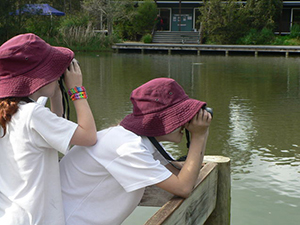Fieldwork
|
Fieldwork is integral and essential to the study of geography. It is mandatory for all students K–10. Fieldwork activities should be integrated into teaching and learning, be planned to meet syllabus outcomes and be stage appropriate. In K–6, fieldwork should immerse students in their environment so that they tune into and make sense of their world. Fieldwork becomes more comprehensive as students move through the stages. By Stage 4, students use professional fieldwork equipment and techniques to collect more complex data and information. Use the Geographical tools resource for fieldwork applications, sites and tools. If you have access to an iPad or Mac computer, download Fieldwork K-6, a Multi-Touch book which includes instructional guides and videos in fieldwork activities.
|
 |
Select your stage for information on stage appropriate fieldwork opportunities:
Focus: school grounds and areas adjacent to the school. ‘Nature play’ experiences enable ES1 students to explore the features of natural environments.
Support students to observe their environment using their senses:
-
Look – up, down and around. Notice details and changes.
-
Listen – to natural and human sounds. Notice noise and quiet.
-
Smell – the air, flowers and leaves. Notice the differences in smells of places.
-
Touch – textures of natural and human features. Notice leaves, bark and surfaces underfoot.
|
|
Refer to GeogSpace Selecting a fieldwork site: Foundation year. |
Focus: features and organisation of the school grounds and local area. Fieldwork may also involve investigation of a place outside the local area, such as bushland, woodland, a beach, park, or a wetland.
As for ES1, sensory experiences and ‘nature play’ strategies enable students to examine the features of natural environments.
Opportunities:
-
recording the weather
-
describing human and natural features
-
observing actions that care for places
-
interviewing family members about connections to places.
|
|
Refer to GeogSpace Selecting a fieldwork site: Years 1 and 2. |
Focus: fieldwork that investigates the characteristics of Australian environments and sustainable practices that protect them. This could include a case study of a vegetation type in a local natural area or a nearby national park or reserve. Fieldwork could also investigate a town or city, or compare cities in neighbouring countries.
Opportunities:
|
|
Refer to GeogSpace Selecting a fieldwork site: Years 3 and 4. |
Focus: influences of people on environments and environments on people. Fieldwork can be part of a case study that examines a current local or regional planning issue either within the local area or a more distant place. Examples include an agricultural area, a natural reserve or a city.
Opportunities:
|
|
Refer to GeogSpace Selecting a fieldwork site: Years 5 and 6. |
Focus: increasing emphasis on independent observations, recording and data analysis.
Opportunities:
|
|
Refer to GeogSpace Selecting a fieldwork site: Years 7 and 8. |
Focus: increased emphasis on independent observations, recording, data analysis and reporting.
-
investigating the environmental impacts of biodiversity loss in the local area
-
investigating the characteristics of an urbanised local place
-
investigating the cultural diversity of a suburb or town in terms of migration
-
investigating aspects of human-induced environmental changes that challenge sustainability in local or regional landscapes.
|
|
Refer to GeogSpace Selecting a fieldwork site: Years 9 and 10. |

